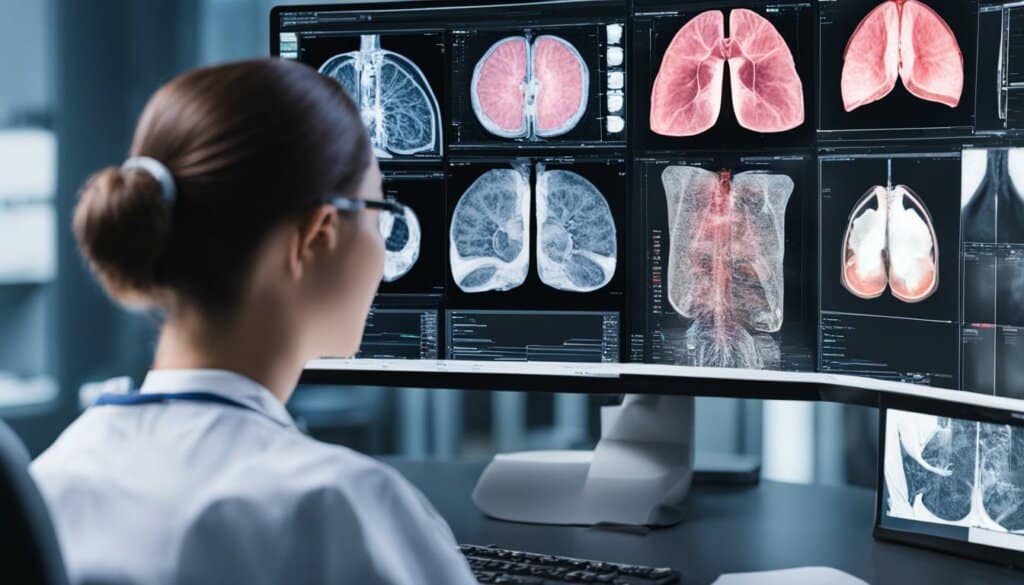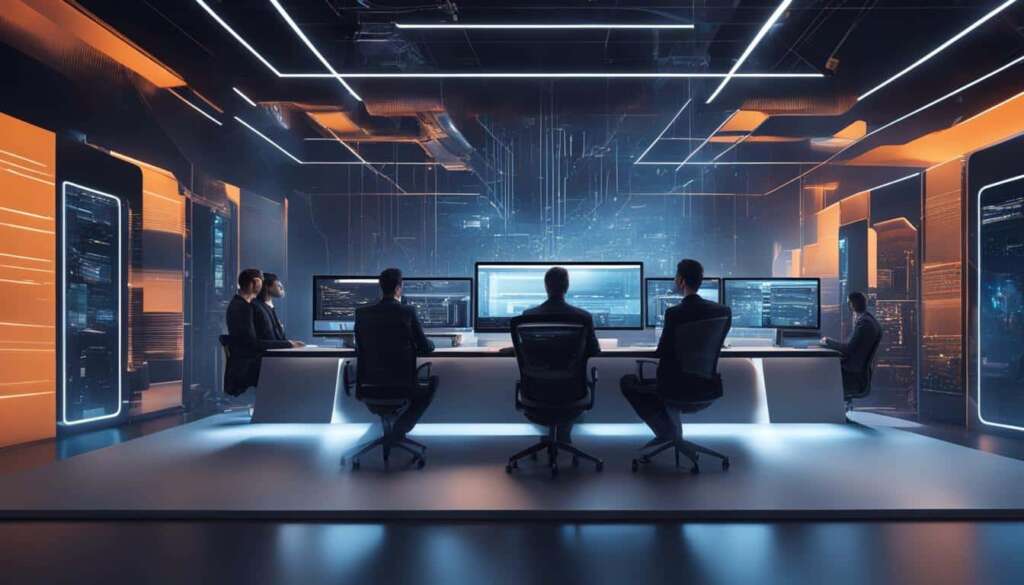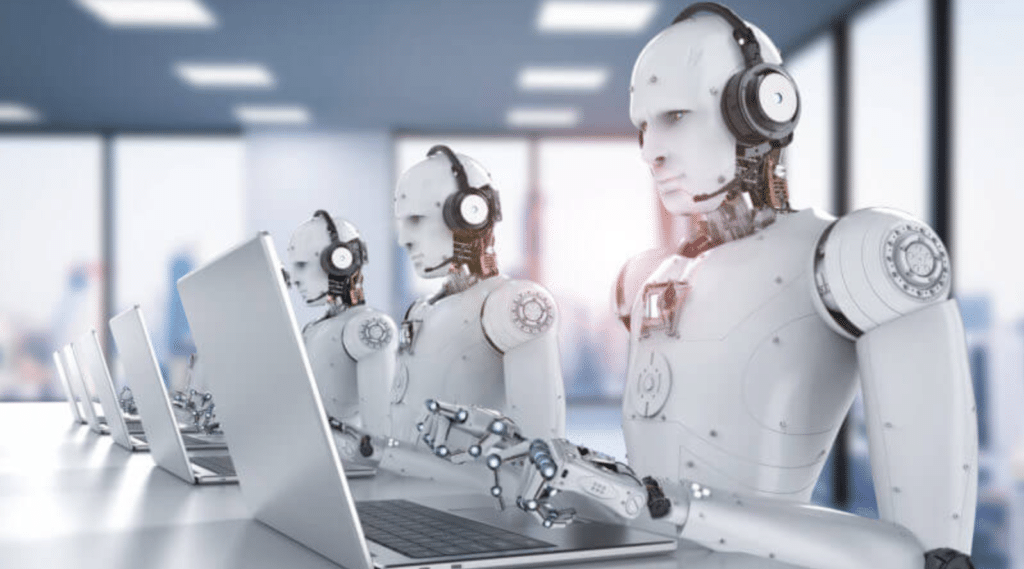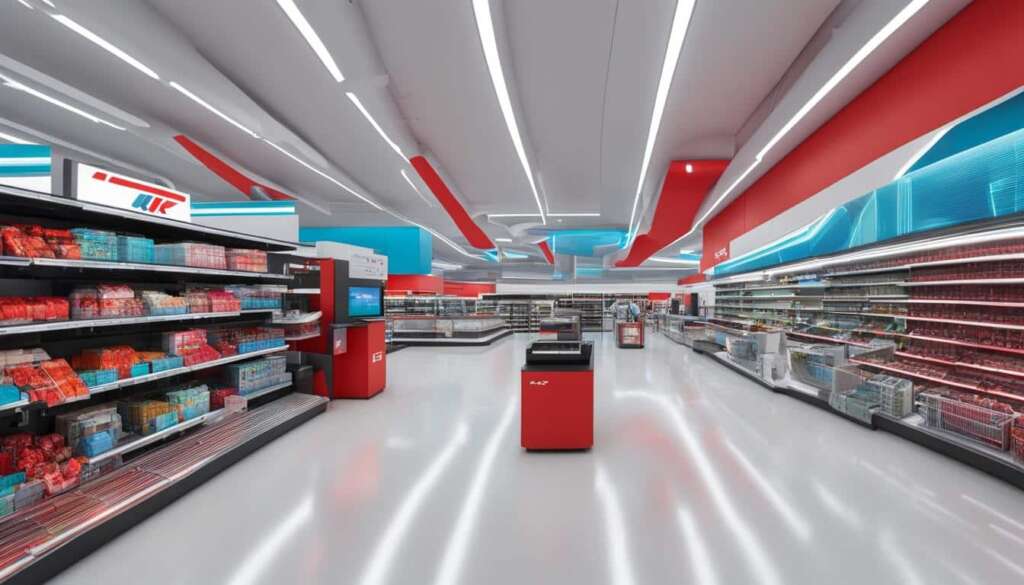Table of Contents
Computer vision, a branch of artificial intelligence (AI), is revolutionising various industries in the UK. It enables machines to interpret and understand visual information, similar to how humans do but with greater speed and capacity. Computer vision uses techniques such as image recognition, machine learning, and deep learning to analyse images and videos, allowing for a wide range of applications.
This technology is transforming industries such as retail, healthcare, logistics, and manufacturing by automating processes, improving efficiency, and enabling new possibilities in areas like object detection, augmented reality, and image processing. With computer vision, businesses can enhance customer experiences, streamline operations, and make data-driven decisions.
In the retail sector, computer vision is used for various applications such as cashierless checkout, loss prevention, analytics, quality control, and inventory management. It enables retailers to streamline the checkout process, detect suspicious activities, optimise store layouts, and improve inventory management. Additionally, computer vision ensures quality control by detecting defects or imperfections in products, leading to higher customer satisfaction and trust in the brand.
In the healthcare industry, artificial intelligence and computer vision are revolutionising diagnostics, preventive care, robotic surgery, remote patient monitoring, and personalised medicine. AI-powered algorithms can analyse medical images for faster and more accurate diagnoses, while remote patient monitoring systems allow for continuous monitoring of vital signs and early detection of diseases. Robotic surgery systems powered by AI algorithms assist surgeons in complex procedures, increasing precision and minimising invasiveness.
Furthermore, computer vision and artificial intelligence are transforming business processes across industries in the UK. AI-powered automation is not only replacing repetitive tasks but also impacting white-collar professions. While there is a concern about job redundancy due to automation, new opportunities are emerging for human workers to focus on tasks that require creativity, critical thinking, and emotional intelligence. AI can augment human capabilities, freeing up time for higher-value activities and enabling human-machine collaboration.
By leveraging the power of computer vision and artificial intelligence, the UK can unlock the full potential of these technologies for the betterment of society. However, responsible usage practices and ethical considerations surrounding privacy, security, and transparency must be prioritised. As computer vision continues to transform industries, it is crucial to nurture a balance between technological advancements and human expertise.
The Impact of Computer Vision in Retail
AI-powered computer vision technology is revolutionizing the retail industry in the UK. With its ability to analyze and interpret visual information, computer vision is transforming various aspects of retail operations, from customer experience to inventory management.
One of the significant applications of computer vision in retail is the development of cashierless checkout systems. These systems use image recognition to track and identify products selected by customers, streamlining the checkout process and improving overall efficiency. By eliminating the need for traditional checkouts, retailers can enhance the customer experience by reducing waiting times and providing a seamless checkout process.
Computer vision is also instrumental in loss prevention and security within retail stores. It can detect suspicious behaviors, shoplifting incidents, and even employee theft through a technique called sweethearting. By leveraging computer vision technology, retailers can effectively monitor their premises, ensuring the safety and security of both customers and merchandise.
Furthermore, the use of computer vision in retail enables valuable analytics on customer behavior. By analyzing visual data, retailers can gain insights into customer demographics, preferences, and shopping patterns. This information can inform decision-making processes, such as optimizing store layouts and improving inventory management to meet customer demands.
Lastly, computer vision in retail plays a crucial role in ensuring quality control. By automatically detecting defects or imperfections in products, retailers can maintain high product standards and improve customer satisfaction. Whether it is identifying flaws in clothing items or checking for expiration dates on perishable items, computer vision technology enhances the overall quality assurance process in retail.
The Impact of Computer Vision in Retail – Summary:
- Computer vision in retail enables cashierless checkout systems, improving the customer experience and streamlining the checkout process.
- Loss prevention and security are enhanced through computer vision’s ability to detect suspicious behaviors and incidents of theft.
- Visual data analytics provide valuable insights into customer behavior, allowing retailers to optimize store layouts and improve inventory management.
- Computer vision ensures quality control by automatically detecting defects or imperfections in products, improving overall customer satisfaction.
| Application | Benefits |
|---|---|
| Cashierless Checkout Systems | Streamline the checkout process and enhance the customer experience. |
| Loss Prevention and Security | Detect and prevent shoplifting incidents and employee theft. |
| Visual Data Analytics | Gain insights into customer behavior, optimize store layouts, and improve inventory management. |
| Quality Control | Detect defects or imperfections in products, ensuring high product standards and customer satisfaction. |
The Transformative Power of AI in Healthcare
Artificial intelligence (AI) is revolutionizing the healthcare industry in the UK, with its transformative power making a significant impact. AI-powered diagnostic algorithms are enabling healthcare professionals to analyze medical images more accurately and efficiently, leading to improved patient outcomes. The use of AI in diagnostics is transforming healthcare by reducing diagnosis time, identifying diseases at earlier stages, and improving the accuracy of diagnoses.
Preventive care is also being enhanced through AI in healthcare. Continuous monitoring of vital signs and early detection of diseases are made possible through AI algorithms. This proactive approach allows healthcare providers to intervene earlier, potentially preventing the progression of diseases and improving patient outcomes. AI technology is empowering healthcare professionals with valuable insights and data-driven decisions, ultimately leading to better patient care.
“AI-powered diagnostic algorithms are enabling healthcare professionals to analyze medical images more accurately and efficiently, leading to improved patient outcomes.”
The Advancements in Robotic Surgery
Robotic surgery is another area in which AI is making a significant impact in healthcare. With AI-powered robotic surgery systems, surgeons can perform complex procedures with increased precision and minimal invasiveness. These systems assist surgeons by providing real-time data analysis, enhancing their decision-making process and improving surgical outcomes. Robotic surgery is transforming the field of surgery, enabling less invasive procedures and faster recovery times for patients.
Remote patient monitoring is yet another application of AI in healthcare. Through the use of sensors and machine learning algorithms, patients can be monitored at home, and their data can be transmitted to healthcare providers. This allows for proactive management of chronic conditions, early detection of deteriorating health, and timely intervention. Remote patient monitoring improves accessibility to quality care while reducing the burden on healthcare facilities.
Personalized Medicine and AI
AI is also enabling personalized medicine, revolutionizing the way healthcare is delivered. By analyzing patient data, AI algorithms can identify patterns and make predictions about individual patient needs. This personalized approach to medicine allows for tailored treatments and interventions based on unique patient characteristics, ultimately improving patient outcomes and satisfaction.
Table: Applications of AI in Healthcare
| Application | Description |
|---|---|
| Diagnostics | AI-powered algorithms analyze medical images for faster and more accurate diagnoses. |
| Preventive Care | Continuous monitoring of vital signs and early detection of diseases. |
| Robotic Surgery | AI-powered robotic systems assist surgeons in complex procedures, increasing precision and minimizing invasiveness. |
| Remote Patient Monitoring | Monitoring patients at home and transmitting data to healthcare providers for proactive management of health conditions. |
| Personalized Medicine | AI analyzes patient data to tailor treatments and interventions based on individual characteristics. |
AI is transforming healthcare in the UK, from revolutionizing diagnostics and preventive care to advancing robotic surgery and enabling personalized medicine. These advancements have the potential to improve patient outcomes, enhance the delivery of healthcare services, and ultimately transform the way healthcare is practiced.

Automation and AI in Business Processes
Artificial intelligence (AI) and automation are revolutionizing business processes across industries in the UK. With the advancement of AI technology, businesses are now able to streamline their operations, enhance efficiency, and make data-driven decisions. Automation is not only replacing repetitive tasks but also transforming white-collar professions, introducing a new era of human-machine collaboration in the workplace.
By leveraging AI in business processes, organizations can optimize efficiency and productivity. AI-powered automation systems can handle complex tasks with speed and accuracy, freeing up employees’ time to focus on higher-value activities that require creativity, critical thinking, and emotional intelligence. This shift in job responsibilities allows businesses to maximize human potential and drive innovation.
Efficiency is a key benefit of incorporating AI into business processes. AI algorithms can analyze large datasets, identify patterns, and make predictions, enabling businesses to make data-driven decisions. This data-driven approach helps companies optimize processes, improve product quality, and enhance customer satisfaction. By automating repetitive tasks, organizations can achieve higher efficiency levels, reduce errors, and allocate resources more effectively.
The Transformation of Job Roles
While there may be concerns about job transformation and redundancy due to automation, the integration of AI actually opens up new opportunities for employees. As repetitive tasks become automated, employees can transition to more fulfilling and strategic roles that require human skills and expertise. This includes problem-solving, decision-making, and customer interaction, which are critical for business success.
“The role of AI is to augment human capabilities, not replace them. We need to embrace the collaboration between humans and machines to achieve the best results.”
The partnership between humans and AI systems is reshaping the job landscape and highlighting the importance of human skills in the workforce. Rather than fearing job displacement, businesses and employees can embrace the transformative power of AI to create a more efficient and productive work environment.
| Benefits of Automation and AI in Business Processes | Examples |
|---|---|
| Enhanced efficiency | – Automation of repetitive tasks – Streamlined workflows – Data-driven decision-making |
| Improved productivity | – Faster processing and analysis of data – Reduction in human error – Optimal resource allocation |
| Job transformation | – Transition to higher-value roles – Focus on creativity and problem-solving – Human-machine collaboration |
Conclusion
Computer vision and artificial intelligence (AI) have the transformative power to revolutionise industries in the UK, including healthcare, retail, and business processes. Through the use of computer vision, industries can unlock new possibilities, automate processes, and improve efficiency.
In healthcare, AI-powered diagnostic algorithms are improving patient outcomes by providing faster and more accurate diagnoses. Preventive care is enhanced through continuous monitoring of vital signs and early detection of diseases. Robotic surgery systems powered by AI algorithms assist surgeons in complex procedures, increasing precision and minimising invasiveness. Remote patient monitoring systems equipped with sensors and machine learning algorithms allow for monitoring patients at home, improving accessibility to quality care. AI is also enabling personalised medicine by analysing patient data and tailoring treatments to individual needs.
In the retail industry, computer vision is transforming customer experiences by enabling cashierless checkout systems, improving inventory management, and ensuring quality control. It also helps in loss prevention and security by detecting suspicious behaviours and shoplifting incidents. By collecting valuable analytics on customer behaviour, retailers can optimise store layouts and enhance customer satisfaction and trust in the brand.
Across various industries, AI-powered automation is streamlining operations, enhancing efficiency, and making data-driven decisions. While concerns about job redundancy exist, AI presents new opportunities for human workers to focus on tasks that require creativity, critical thinking, and emotional intelligence. By embracing the potential of computer vision and AI while valuing human skills and expertise, the UK can unlock the full transformative power of these technologies for the betterment of society.
FAQ
What is computer vision?
Computer vision is a branch of artificial intelligence (AI) that enables machines to interpret and understand visual information, similar to how humans do but with greater speed and capacity.
What techniques are used in computer vision?
Computer vision uses techniques such as image recognition, machine learning, and deep learning to analyze images and videos.
How is computer vision transforming industries in the UK?
Computer vision is revolutionizing industries such as retail, healthcare, logistics, and manufacturing by automating processes, improving efficiency, and enabling new possibilities in areas like object detection, augmented reality, and image processing.
How is computer vision being used in the retail industry?
Retailers are leveraging computer vision for various applications, including cashierless checkout systems, loss prevention and security, customer behavior analytics, inventory management, and quality control.
What impact does AI-powered computer vision have on healthcare?
AI-powered computer vision technology improves diagnostics, preventive care, robotic surgery, remote patient monitoring, and personalized medicine in the healthcare industry.
How does AI and automation transform business processes?
AI-powered automation streamlines operations, enhances efficiency, and enables data-driven decision-making in business processes. It also leads to job transformation and emphasizes the importance of human skills.
How can the UK ensure responsible usage of computer vision and AI?
It is important to navigate ethical considerations surrounding privacy, security, and transparency while leveraging the power of AI and valuing human skills and expertise.












